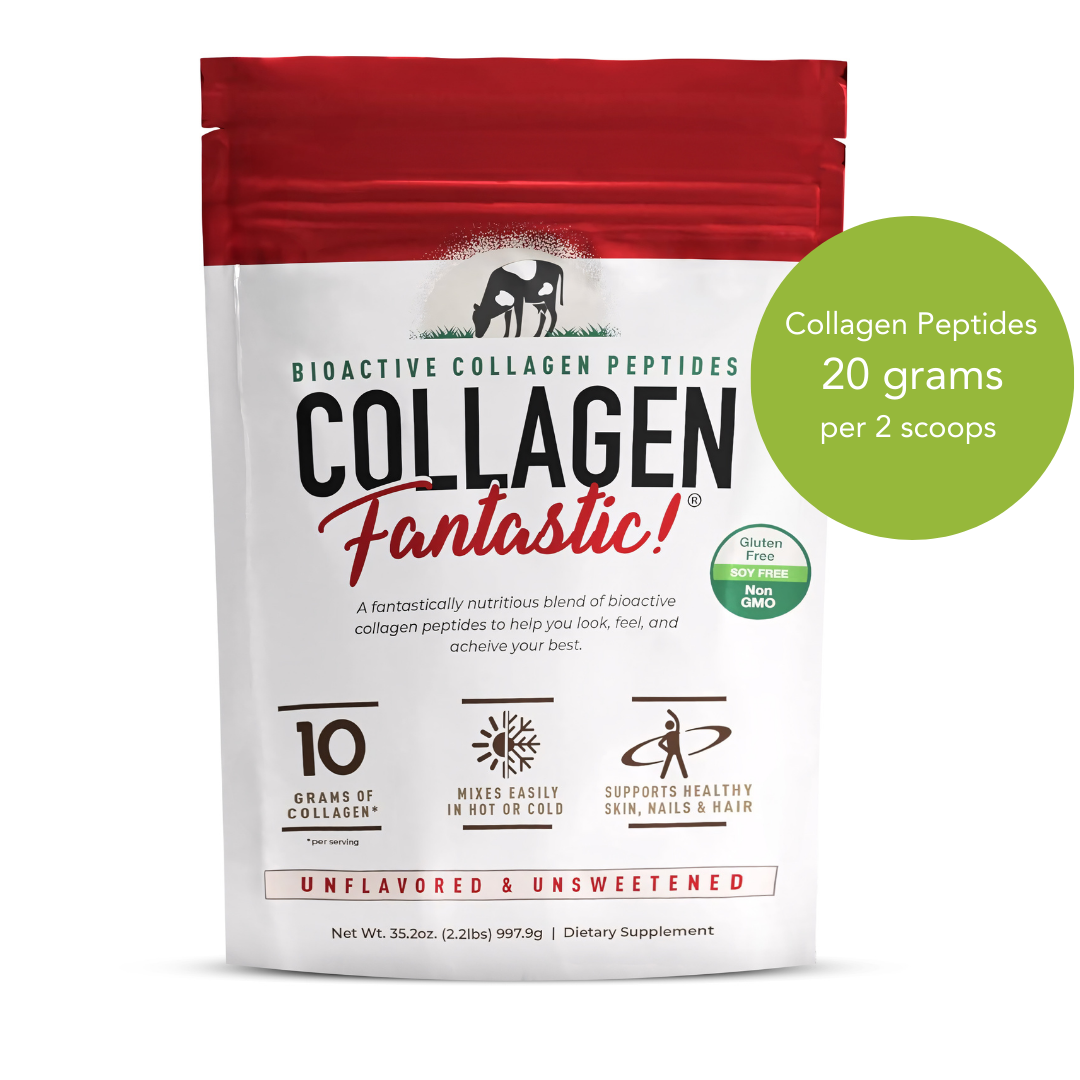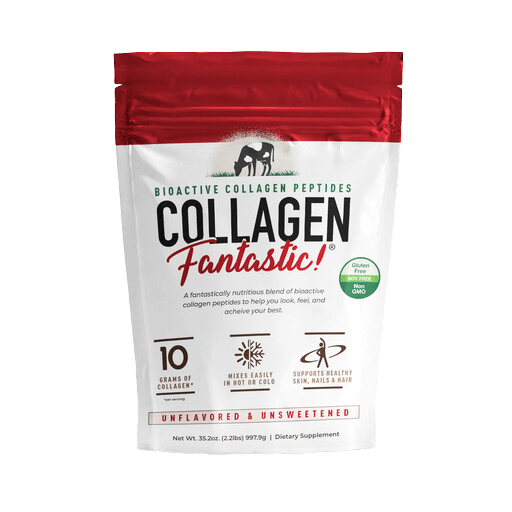Key Takeaways
-
Protein needs increase with age — not decrease — because your body becomes less efficient at using it for repair and muscle maintenance.
-
In your 30s, 40s, and beyond, more protein supports lean muscle, metabolism, bone density, and recovery.
-
Most adults benefit from 0.8–1.0 grams of protein per pound of body weight daily, spread evenly through meals.
-
Whey Protein, Collagen Fantastic, and Creatine Fantastic together create a complete system for muscle, joint, and recovery support as you age.
-
Building strength, energy, and longevity starts with feeding your body — not depriving it.
Introduction: The Protein Paradox
When you think of protein, you might picture athletes, bodybuilders, or post-workout shakes. But the truth is, the older you get, the more important protein becomes — not for bulking, but for simply staying strong, mobile, and energized.
Starting as early as your 30s, your body gradually loses its ability to use protein as efficiently. That means the same meals that kept you fit in your 20s might not fully support recovery or muscle maintenance now.
The result?
-
Slower recovery after workouts.
-
Gradual muscle loss (even if you’re active).
-
A slower metabolism and more fatigue.
The fix isn’t complicated — but it does require a shift in how you think about fueling your body.
Why Protein Needs Increase With Age
1. Your Body Uses Protein Less Efficiently
This process, called anabolic resistance, means that as you age, your muscles don’t respond as strongly to the same amount of protein.
In your 20s, 20 grams of protein might have triggered full muscle repair. In your 40s or 50s, you may need closer to 30–40 grams for the same effect.
That’s why increasing protein intake — especially from high-quality, complete sources — helps your body continue building and maintaining lean tissue.
2. Muscle Is Metabolic Gold
Muscle isn’t just for strength — it’s your body’s most metabolically active tissue.
It burns calories, supports blood sugar balance, and keeps your metabolism humming even at rest.
When muscle mass declines with age (a process known as sarcopenia), energy levels and metabolism drop too.
Protein helps slow or reverse that process — keeping you stronger, leaner, and more energetic.
3. Protein Supports Recovery and Resilience
As you age, recovery takes longer — from workouts, stress, even long days of activity.
Protein provides the amino acids your body needs to repair tissues, recover faster, and adapt to training.
Combined with Creatine Fantastic, which replenishes energy at the muscular level, and Collagen Fantastic, which supports connective tissue and joint repair, protein becomes the foundation for feeling strong — not just looking it.
4. Protein Protects More Than Muscle
Protein is also the building block for enzymes, hormones, skin, hair, and immune cells.
That means adequate intake supports:
-
Bone density, by maintaining muscle that stabilizes your skeletal system.
-
Joint health, through collagen synthesis and repair.
-
Cognitive health, by regulating neurotransmitters that influence mood and focus.
Protein isn’t just about workouts — it’s about overall vitality.
How Much Protein Do You Really Need?
Most research suggests that active adults over 40 benefit from 0.8–1.0 grams of protein per pound of body weight daily.
For example:
-
A 150-pound person = 120–150 grams per day.
-
A 180-pound person = 145–180 grams per day.
This might sound like a lot, but when you spread it evenly across meals and snacks, it’s very achievable.
The Importance of Protein Distribution
It’s not just how much you eat — it’s when.
Your body can only use so much protein at once. Spacing it evenly through your day keeps muscle repair and metabolism active around the clock.
Example daily rhythm:
-
Breakfast: Oats with 1 scoop Whey Protein + fruit (30g protein)
-
Lunch: Chicken, quinoa, and veggies (35g protein)
-
Snack: Greek yogurt or smoothie with Collagen Fantastic (25g protein)
-
Dinner: Salmon, sweet potatoes, and greens (35–40g protein)
This steady rhythm keeps your energy stable and your body in a constant state of renewal.
Quality Matters: Why All Protein Isn’t Equal
Your body needs a full range of amino acids to build and repair muscle effectively. That’s why complete protein sources matter — foods or supplements that include all nine essential amino acids.
Complete Protein Sources
-
Eggs
-
Fish and poultry
-
Whey protein
-
Lean meats
-
Soy (for plant-based diets)
Complementary Protein Sources
-
Beans + rice
-
Nuts + whole grains
-
Collagen (paired with other amino acids or foods)
Fantastic Nutrition Whey Protein provides a complete amino acid profile for muscle recovery, while Collagen Fantastic supplies additional structural amino acids (glycine, proline, hydroxyproline) that support skin, joints, and gut health.
How Protein Supports Longevity
Protein is often overlooked in conversations about longevity — but it’s one of the most important nutrients for aging well.
Here’s how:
-
Muscle maintenance prevents frailty and supports balance.
-
Improved metabolism reduces the risk of insulin resistance.
-
Better bone density reduces risk of falls and fractures.
-
Faster recovery helps you stay active and consistent.
A strong body is a resilient body — and protein is what makes it possible.
How to Know If You’re Not Getting Enough
Subtle signs of low protein intake often go unnoticed.
Watch for:
-
Increased soreness or slow recovery after activity
-
Loss of strength or muscle tone
-
Fatigue or afternoon energy crashes
-
Brittle nails or thinning hair
-
Frequent illness or slow wound healing
These are signals your body needs more support — not more restriction.
Simple Ways to Add More Protein to Your Day
-
Add a scoop of Whey Protein to oatmeal or smoothies.
-
Stir Collagen Fantastic into coffee or tea.
-
Snack on Greek yogurt, boiled eggs, or edamame.
-
Choose protein-forward meals (lean meats, tofu, fish, legumes).
-
Keep a post-workout shake ready — consistency beats complexity.
You don’t have to overhaul your diet — just make small, consistent upgrades that fuel your body.
Frequently Asked Questions
1. How much protein can my body absorb at once?
About 25–40 grams per meal is ideal for muscle protein synthesis, though your body will still utilize more for other processes like enzymes and hormones.
2. Do I need more protein if I’m active?
Yes — activity increases your repair and recovery demands. Most active adults benefit from 1.0g per pound of body weight daily.
3. Can I get enough protein from food alone?
You can, but it’s often difficult to reach optimal levels without supplementation, especially with age-related changes in appetite or digestion. Whey Protein and Collagen Fantastic make it easier and more consistent.
4. Is there such a thing as too much protein?
For healthy adults, protein up to 1.2–1.5g per pound of body weight daily is safe and beneficial. If you have kidney or liver conditions, consult a healthcare provider first.
The Bottom Line
Protein is more than a nutrient — it’s a signal to your body to stay strong, resilient, and youthful.
As you age, your protein needs don’t shrink — they grow. Meeting those needs isn’t about eating more, it’s about eating smarter — choosing complete, high-quality sources that fuel your body’s ability to recover, move, and thrive.
Fantastic Nutrition Whey Protein, Collagen Fantastic, and Creatine Fantastic together form a simple, effective system to keep your muscles, energy, and recovery at their best — for every decade ahead.
Try Whey Fantastic risk-free today!

]











